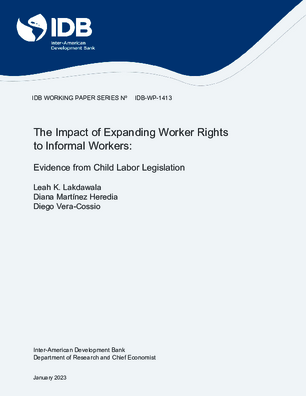The Impact of Expanding Worker Rights to Informal Workers Evidence from Child Labor Legislation
Date
Jan 2023
We study the effects of a Bolivian law that introduced benefits and protections for child workers (who are overwhelmingly informal workers) and lowered the de facto legal working age from 14 to 10. We employ a difference-in-discontinuity approach that exploits the variation in the laws application to different age groups. Work decreased for children under 14, whose work was newly legalized and regulated under the law, particularly in areas with a higher threat of inspections. The effects appear to be driven by a reduction in the most visible forms of child work, suggesting that firms may have reduced employment of young children to minimize the risk of being inspected. In contrast, we nd that more formal channels of adjustments - such as increased costs of hiring due to the costs of complying with the new law - are unlikely to explain the overall decline in the work of young children.




